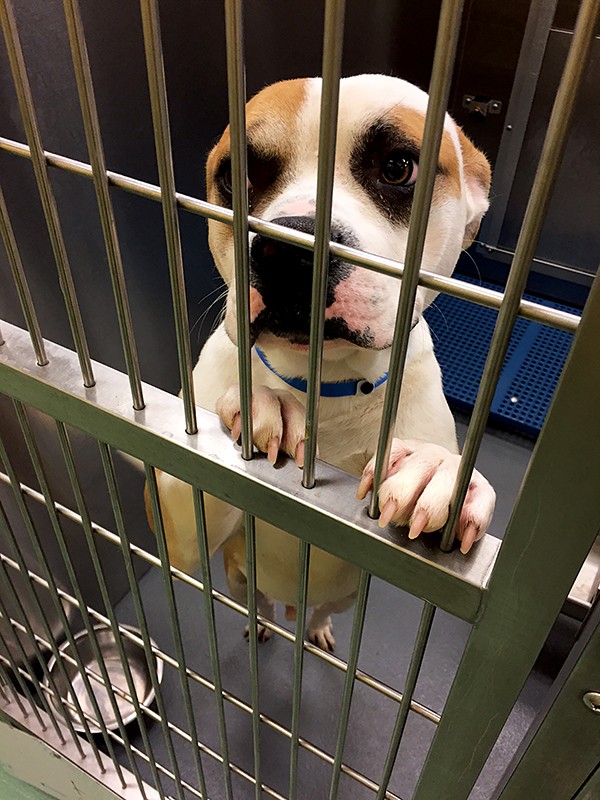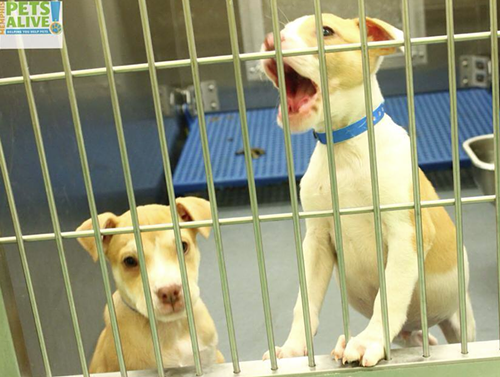Last Friday afternoon, most of the 27 kennels in Memphis Animal Services’ (MAS) stray area were full. There were lots of pit bulls with wiggly butts and wagging tails, and there was a solemn Rottweiler and a well-groomed, fluffy, white dog. And there were a few energetic mutts of questionable heritage.
Before April 1st, most of these dogs wouldn’t have stood a chance since animals in the stray area of the shelter were not available for adoption. But MAS has finally ended its long-standing policy banning the public from adopting dogs from the stray area.
“We’re getting in some really good animals. [Before we opened the stray area], the animals in stray would sometimes be moved to Healthy Hold. But sometimes, they wouldn’t get that opportunity,” said MAS Administrator James Rogers.
 Bianca Phillips
Bianca Phillips
A dog in the shelter’s stray area last week
Healthy Hold is a sort of intermediate area, where dogs go as they await their move to the adoption area. There are 57 cages in Healthy Hold. The adoption area, which features animals that shelter staff has deemed “adoptable” based on temperament and health, has 72 cages. Before this month, the public was only allowed to adopt animals from the adoption area. In fact, unless one was looking for a lost pet, members of the public were banned from even entering the stray area.
The stray area was closed to the public in 2010 by former MAS Administrator Matt Pepper. At that time, MAS was located in an aging facilty on Tchulahoma, and Pepper told the Memphis Animal Services Advisory Board meeting back then that separating “adoptable” dogs from stray dogs would help prevent the spread of diseases, since some animals in the stray area were unhealthy. That policy carried over into the new facility on Appling City Cove under Rogers’ leadership.
But rescue groups and animal shelter reform advocates have been pushing MAS to reopen the stray area for adoptions since it closed. They say that many of the dogs in the stray area are adoptable and need to be given a chance.
“We are pleased that voices of animal welfare advocates in the local community are being heard and that quality pets being held in the stray area are being rescued/adopted from this area to become beloved family pets,” said Memphis Pets Alive Executive Director Linda Baxter. “If animals cannot be seen, they cannot be adopted.”
Members of the nonprofit Memphis Pets Alive go into the shelter each Tuesday, photograph every animal, and post those pictures on memphispetsalive.org and their Facebook page in an effort to better market the animals. They’ve recently been allowed to begin photographing the animals in the stray area.
Because some animals in the stray area could have serious health problems or show signs of aggression, Rogers said that not all of the animals in that area may be adopted. Once a person selects a dog from the stray area, shelter staff will assess the dog to ensure it’s safe to adopt.
“We make sure before we allow a pet to be adopted that we have vetted and temperament-tested the pet,” Rogers said.
By opening the stray area, Rogers says he’s hoping the shelter can improve its adoption rates.
Cindy Sanders of Community Action for Animals has been pushing for the stray area to be opened for years.
“This will definitely drive up adoption rates. It will save the lives of animals,” Sanders said. “But my question is, why did it take MAS years to get these changes made? Thousands of animals died before they were ever allowed to be seen. I’m thankful this is happening now, but it should have happened years ago.”
Sanders suggested that the fact that it’s an election year could have been a factor in the city’s decision to open the stray area.
“While we’re thankful for this, we hope that this is a true attitude of progressive change and not just [Mayor A C Wharton’s] way of stumping for votes,” Sanders said.
